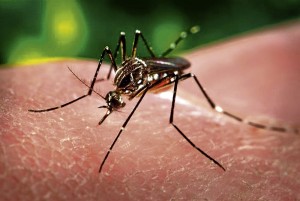CLARK FREEPORT, Philippines—A dengue vaccine will be available by late 2015 or early 2016 to patients battling the mosquito-borne disease, according to an official of an international pharmaceutical firm.
Guillaume Leroy, vice president of the French firm Sanofi Pasteur and head of the company’s dengue vaccine group, made the announcement to participants of the Association of Southeast Asian Nations Dengue Forum held here on Saturday.
Leroy said the collection of all information related to the “candidate vaccine,” the CYD (chimeric yellow fever) dengue vaccine, will be completed this year.
By 2015, Sanofi Pasteur, the vaccines division of the French pharmaceutical company Sanofi, will start applying for licenses with the health authorities of various countries, he said.
“We will submit all the data to health authorities in 2015 to obtain the first license. And as soon as we have the license, by late 2015 or early 2016, we will be in condition to supply the vaccine,” Leroy said.
While the World Health Organization (WHO) issues the guidelines for vaccines, the health authorities of every country are responsible for licensing the sale of vaccines and medicines in their territories, Leroy said.
In the Philippines, he said, Sanofi Pasteur will provide the Department of Health (DOH) with all necessary data about the vaccine and apply for a license.
During the forum, Dr. Rosario Capeding, head of the dengue research program of the DOH Research Institute for Tropical Medicine (RITM), reported that the late-stage (Phase 3) study of Sanofi Pasteur’s candidate vaccine indicated a reduction of dengue cases by 56 percent.
Capeding said the study, which involved 10,275 healthy children in the Philippines and four other Southeast Asian countries, also established that the candidate vaccine was not harmful to children.
The study’s test sites were Cebu City and San Pablo City in Laguna, in the Philippines; Bali and West Java in Indonesia; Kuala Lumpur and Penang in Malaysia; Kamphaeng Phet and Ratchaburi in Thailand; and Long Xuen City and My Tho City in Vietnam.
Children who participated in the study from June 2011 to June 2013 were between 2 and 14 years old. They received three 0.5-millimeter injections of the CYD dengue vaccine at six-month intervals.
Capeding said it was not easy to formulate a dengue vaccine because the disease, primarily caused by the Aedes aegypti mosquito, had four serotypes (microorganism categories) and no animals, not even monkeys, had been suitable for testing.
This is because animals, unlike human test subjects, have a natural biochemical defense mechanism against the disease, she said.
Capeding said recent clinical efforts to create a dengue vaccine involved 19 countries and some 41,000 volunteers.
Leroy said Sanofi Pasteur had been trying to produce a dengue vaccine for the last 20 years.
Sanofi Pasteur’s late-stage study in Southeast Asia was a continuation of its Phase 2 study, which involved some 4,000 children in Thailand in 2012. The earlier study proved that the vaccine was safe, but it also recorded a 30-percent reduction in dengue cases which was exceeded by the Phase 3 study results.
That study also showed that the candidate vaccine was effective only against dengue serotypes 1, 3 and 4, and it offered no protection against serotype 2.
The firm said it had yet to fully analyze all the data on the candidate dengue vaccine and that this would be “reviewed by external experts prior to disclosure at an upcoming international scientific congress and publication in a peer-reviewed journal later this year.”
The French pharmaceutical company is also conducting a second vaccine study involving some 20,000 children in Brazil, Colombia, Honduras, Mexico and Puerto Rico.
The WHO will provide an independent assessment once the detailed study results are made available.
Dengue infects up to 100 million people worldwide per year, WHO said.
